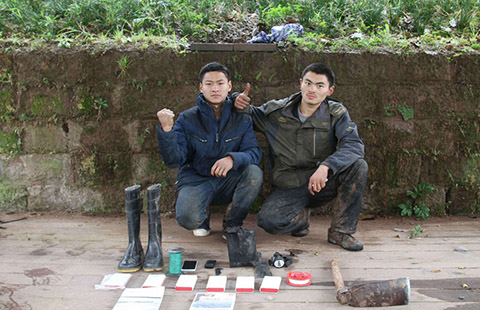Peking University faces mockery over recruitment practices
(Xinhua) Updated: 2012-09-13 22:35BEIJING - A young man who attempted to mock a top university's preference for local students has triggered renewed outcry against rife regionalism in China's colleges.
Cheng Shuaishuai, 22, carried a plaque in front of Peking University Monday with Chinese characters reading "Beijingers' University". The plaque's color, design and typeface were identical to that of a plaque that hangs outside the university's main entrance.
Cheng, a college graduate from the underdeveloped central province of Henan, said he created the plaque to protest high enrollment rates for local students at the university, as well as other Beijing-based higher learning institutions.
Cheng's plan was aborted when he and a fellow campaigner were stopped by university security, who called in police after claiming that the pair had "plotted to disrupt campus order."
Cheng was escorted to a police station, where he was questioned for seven hours before being taken back to his hometown.
Cheng's satire has made a splash on the Internet, with netizens praising Cheng's demonstration and criticizing the university's reaction.
"It's sad that one of the country's top universities, which has stressed openness and tolerance for over a century, could not bear a few words of sarcasm," read a post on Sina Weibo, a Twitter-like microblogging site.
Some bloggers linked the university's response to mounting public pressure placed on the nation's leading universities, which have been criticized for using unfair criteria that prevent students from other parts of the country from being admitted.
Last year, Peking University recruited 248 students from Beijing, a city with 76,000 candidates for the national college entrance exam. However, it accepted only 72 students from Henan, which had more than 10 times as many applicants.
Cheng said he enrolled in a "mediocre" private school in 2008, studying there for three years.
"I scored a 510 on the college entrance exam in Henan. If I were from Beijing, that score could secure me a place at a top university," he said.
After he finished college last year, Cheng became an avid campaigner, staging multiple public "performances" to protest what he believes to be unfair admittance practices.
He also teamed up with three high school students from Henan to send Ministry of Education a basket of pears. The Chinese word for "pear" is similar to that for "pressure."
The "gift" was politely turned down, but the four posed for photos with it outside the ministry's compound, creating a sensation online.
Cheng said their complaints center around China's "hukou," or household registration system that essentially binds residents to their hometowns.
The system strictly requires students to take college entrance exams in the area designated by their hukou. Chinese universities, like many elsewhere, almost always recruit more students locally.
"If students can freely choose where to take the test, colleges won't be able to discriminate against certain regions in terms of admitting students," Cheng said.
Chinese universities tend to recruit more students from urban areas, a holdover from the planned-economy era, when a college education guaranteed a job.
In recent years, the system has prevented students from underdeveloped regions from attending top universities, as well as forced the children of migrants to study in their remote hometowns instead of the cities, where their parents usually work.
The system's problems resurfaced after the Ministry of Education issued a document last month asking local authorities to offer solutions for migrant workers' children within the year.
Minister of Education Yuan Guiren said authorities are working to eliminate the regional college enrollment gap by encouraging schools to recruit more students from China's central and western regions.
But such remarks also caused concerns among residents in big cities, who feared the inflow of outsiders would grab educational resources.
"I hope my act could draw public attention to the unfair college admittance practices. I won't give up campaigning," Cheng said.
"When Peking University celebrates its 115th founding anniversary next year, I will send a big cake and invite its president to share it with others. The sharing of the cake will symbolize the equal sharing of education resources," he said.
- Hopes voiced for next five years
- Efforts urged to improve money laundering law
- Luring shoppers home with quality
- China cuts red tape on intermediary services for administrative approval
- Unique brown panda survives winter
- Govt office set up to protect juveniles
- China preparing to raise retirement age: report
- China to launch second space lab Tiangong-2 in Q3
- Behind China's rising divorce rate: impulse or relief?
- G20 finance ministers to avoid competitive currency devaluation







